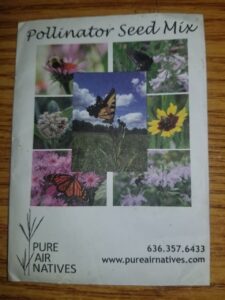Final report for SVI16-001
Project Information
The University of the Virgin Islands (UVI), an 1862 establishment, is the only Land Grant institution in the United States Virgin Islands (USVI). The on-going Professional Development training initiatives of the Sustainable Agriculture Research & Education (SARE) Program are administered and coordinated by the UVI Cooperative Extension Service in collaboration with partners from the public and private sectors throughout the territory. These partners include, but are not limited to, the UVI Agricultural Experiment Station, the Small Business Development Center, the VI Department of Agriculture, FINTRAC, the St. Thomas/St. John Livestock Association, the Good Food Coalition, and We Grow Food, Inc.
The proposed activities for the 2016-2017 Professional development activities will target outreach professionals in agriculture from territorial/state, NGOs and federal partner agencies as well as mentor farmers. The state and federal agencies will include, but are not limited to the University of the Virgin Islands Cooperative Extension Service, University of the Virgin Islands Agricultural Experiment Station, the Virgin Islands Department of Agriculture, USDA Natural Resource Conservation Service, and the USDA Farm Service Agency. Mentors from farmers’ organizations and other NGO’s will also comprise the training audience. These entities include the St. Croix Farmers in Action, the St. Thomas/St. John Livestock Association, the Virgin Islands Good Food Coalition, and We Grow Food, Inc.
The goal of the educational activities in this Plan of Work is to increase the level of knowledge and awareness among state and federal outreach staff and mentor farmers in the Virgin Islands regarding the SARE program and appropriate strategies to address local challenges and concerns. The ‘Train the Trainer’ approach will be primarily employed as a method to increase the capacity and capability of the SARE team members to effectively provide educational and outreach programs to farmers of crop and livestock operations, NGO’s and other outreach staff from territorial/state and federal agencies. The overall goal of the professional development activities is to ensure that trainers are properly educated regarding the latest research based information on appropriate sustainable agricultural strategies and technology. Subsequently, trained personnel would be able to provide improved technical assistance to our farmers and other stakeholders. We anticipate that when local farmers effectively adopt more sustainable agriculture production practices, the Virgin Islands will benefit from increased food production while stimulating economic growth, enhancing environmental quality, and improving the quality of life for all residents.
Advisors
- (Researcher)
Education
In order to achieve our training goals, the Train the Trainer approach was utilized. In addition, a hands-on approach to learning was used as much and wherever possible. Extension staff, researchers, USDA personnel and mentor farmers participated in all the educational projects. The activities focused on increasing knowledge and practical application regarding conservation covers, buffers, and hillside farming in both districts of the territory (i.e. St. Croix and St. Thomas/St. John). During the educational sessions, the trainers emphasized the utilization of resources that were easily available.
Participation in the National Small Farms Conference also provided a very unique opportunity for our agricultural professionals and mentor producers to network and learn from a diverse, nation-wide group of trainers. The trainees from the Virgin Islands also increased their general knowledge regarding sustainable agriculture through practical and hands-on engagements during the mini course and field trip activities. As a result of these engagements our team members learned about the strategic use of wild flower species to promote sustainable agriculture. Moreover, our farmers were given samples of wild flower pollinator seed mixes from the Western States that were used to establish trap rows. Trap rows is a new concept to many of our Virgin Island farmers. The farmers subsequently sowed and experimented with the seeds as a part of their own operations. Our producers realized varying results by utilizing the pollinator seed mixture. However, these experiences have encouraged interest in using local wild flower species to establish buffer areas and trap crop rows as a sustainable agricultural practice.
Example of seed mix farmers received
Education & Outreach Initiatives
Create a better understanding of the relationship of healthy plants to healthy soil
On site training for Ag professionals, farm mentors and farmers to show the different types of cover crops which are available to be used in the Virgin Islands as green manure and for soil rejuvenation purposes
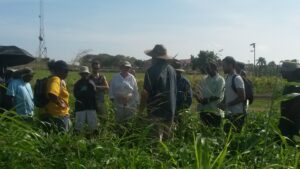
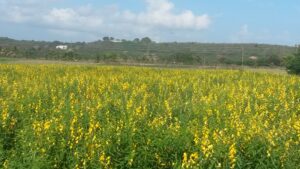
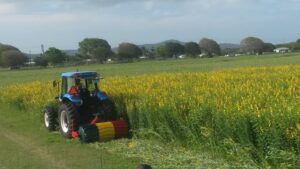
After the workshops many the Ag professionals and mentor farmers worked with other local farmers to use the cover crops that are pictured above along with other species such as Clitoria ternatea, Sun flower Velvet Bean, tillage radish, and buck wheat to enhance soil structure, biological activity as well as a source of green manure.
Pigeon peas, which is used in the Caribbean as a cash crop was discussed at one of our local training events as a good cover crop and wind break. This practice is currently being put into use by one Virgin Island farmer in Estate Longford on the island of St. Croix. He utilizes pigeon peas as a wind break to protect some of the more delicate crops during the cool, windy months of October to March. In addition, his expectation is that the foliage drop from the pigeon peas will help to improve his soil health and reduce the moisture loss from the drying winds.
Teach Agriculture professionals how to utilize co-operative partnerships for Agricultural success
In partnership with the Federation of Southern Cooperatives, the USVI SARE team conducted two days of interactive training on St. Thomas and St. Croix. The facilitators were experienced trainers from the Federation of Southern Co-operatives. The goal of the training initiative, entitled Cooperatives 101, was to provide an opportunity to introduce the target audience to the principles of the Cooperative Business Model while engaging with practicing cooperators. Specific topic areas included cooperative principles and values, how to start a cooperative, funding cooperative enterprises, recruitment of members, governance and management, and conflict resolution.
As a result of this professional development activity, the trainees increased their knowledge and awareness of the Art and Science of the cooperative business model. The participants requested continued training on this subject and demonstrated interest in exploring possibilities in cooperative business development.
To inform Agricultural professional and mentor farmers of some ways we can address Climate Change
Through a collaboration with the Caribbean Climate Hub and other partners from the U.S. mainland, training sessions were conducted in both political districts regarding the climate change phenomenon and the application of appropriate mitigation strategies. As a result of this effort, the trainers increased their knowledge and awareness of the subject matter and were better prepared to provide technical support to producers. to address the issue of getting the US Virgin Islands on the Drought Monitoring Registry. Discussing the issues which each agency has seen during the 2015 drought that devastated the Agricultural sector of the USVI as well as private industry. Agencies in attendance include but are not limited to USDA PR and USVI, St. Croix Environmental Association (SEA), The VI Department of Ag, University of the Virgin Islands Natural Resources (UVIANR), UVI AES Bio-Tec Coastal Zone Management, Department of Planning and Natural Resources, Coastal Zone Management and many others.
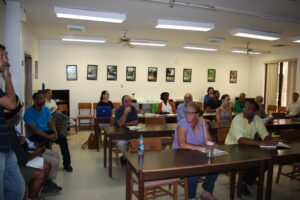
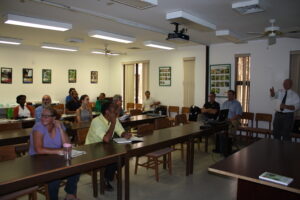
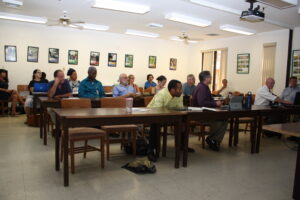
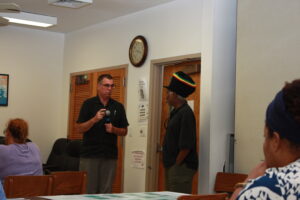
Since the meeting the VI has been added to the Drought Monitoring map which can be found on the attached link https://droughtmonitor.unl.edu/
After the Drought Monitoring Registry meeting UVI Cooperative Extension Service (CES) held a meeting for Agricultural professional and farmer. Presenters from St. Croix Environmental Association (SEA), USDA, UVI CES and UVI Agriculture Experiment Service (AES) presented on the different ways that farmers and the community can address the difficulties faced on an island due to Climate Change. Topics such as drip irrigation, mulching and water retention pond were covered. Another topic covered was Canopy Cover and Soil Health, which expounded on the need for farmer to allow for the presence of trees on their farm to reduce soil temperature.
To teach farmers and Ag professionals how to effectively farm on hillside while preserving the resources and inputs
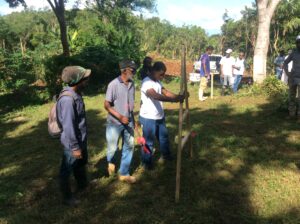
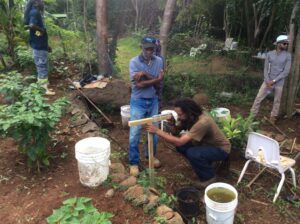
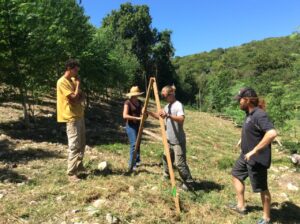
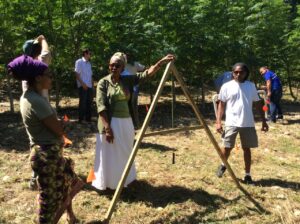
Ag professionals and farmers working together to learning how to construct and utilize simple contour equipment to layout out a hill side farm
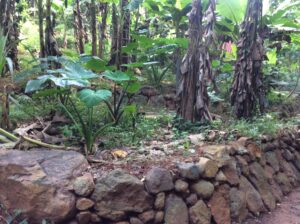
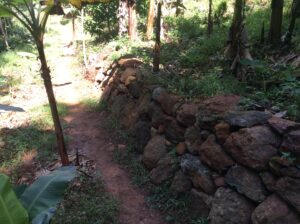
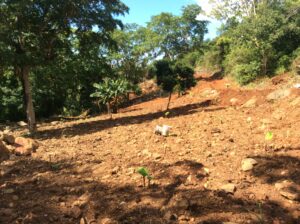
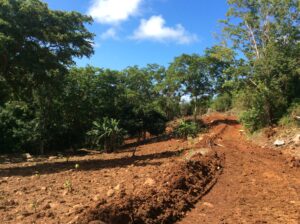
Terracing of hillside and contouring of land for crop production
Use of dasheen and bananas as under-story plants to mitigate soil erosion in water logged areas
A major outcome of this training is that farmers on both the islands of St. Croix and St. Thomas who have hillside properties are now using the techniques of A frames and Bridge or Horse to layout contours for planting their hillside farms.
